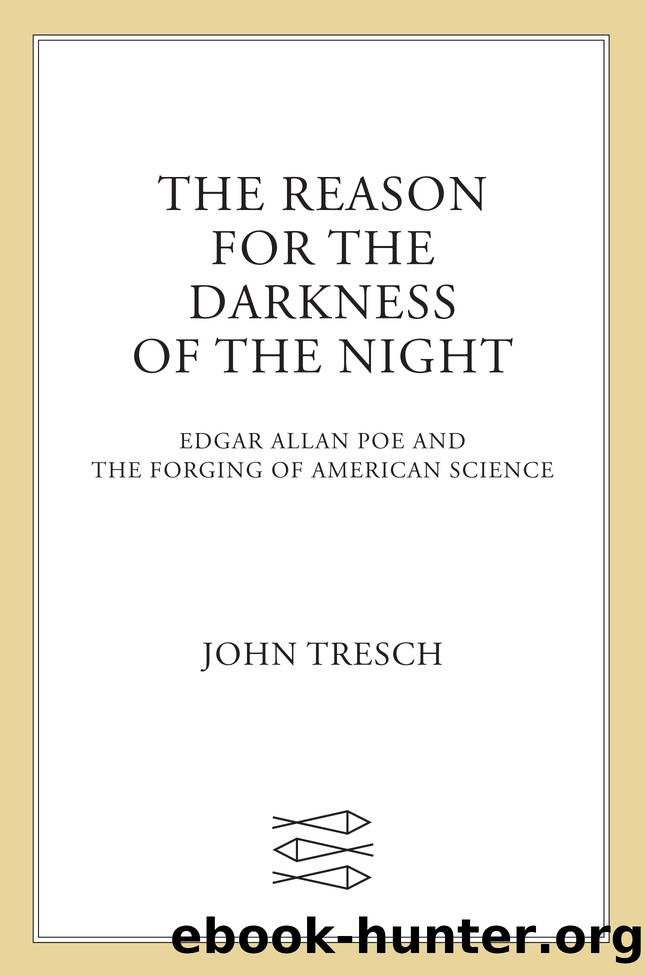The Reason for the Darkness of the Night by John Tresch

Author:John Tresch
Language: eng
Format: epub
Publisher: Farrar, Straus and Giroux
This preference for the strange, unexpected, novel, or seemingly inharmonious would be one of Poeâs decisive contributions to modernist aesthetics.
Poeâs questions about the design underwriting nature intersected with his musings on the tremendous power of words. He described âexperimentsâ he undertook at the limits of waking consciousness, alluding to a âclass of fancies, of exquisite delicacy, which are not thoughts, and to which, as yet, I have found it absolutely impossible to adapt language.â These mental phenomena arise only when the soul is in a state âof most intense tranquility,â in those âpoints of time where the confines of the waking world blend with those of the world of dreamsââwhen he is âupon the very brink of sleep, with the consciousness that I am so.â He described his attempts to bring back lucid reports from this borderland: âNow, so entire is my faith in the power of words, that, at times, I have believed it possible to embody even the evanescence of fancies such as I have attempted to describe.â
His faith in the power of words went further. Charles Babbage, in his provocative Ninth Bridgewater Treatise, developed the implications of the claim in modern physics that every act and motion makes a âpermanent Impressionâ through its impact on the ether: the air becomes a recording device, âone vast library, on whose pages are for ever written all that man has ever said or even whispered.â Babbage, an abolitionist, illustrated this notion with a gruesome anecdote taken from court reports of a slave trader who forced his human cargo overboard; Babbage imagined a record of the victimsâ cries inscribed on the ether, a permanent witness to his sin.
Poe ran with Babbageâs sublime suggestion in a spirit colloquy, âThe Power of Words.â In it, two spirits discuss the ether, that âgreat medium of creationâ; they observe, like Babbage, that the vibrations from every act, from every sound, leave a physical trace. As proof, one of the angels points out a âwild starââa planet newly formed by the angelâs tears: its âbrilliant flowers are the dearest of all unfulfilled dreams,â and its âraging volcanoes are the passions of the most turbulent and unhallowed of hearts.â Through words and tears, thought and feeling literally impress themselves upon matter. They alter the course of natureâs development, forging and remaking worlds.
Just as in the metaphysics sketched in âMesmeric Revelation,â and the experiment in âValdemar,â Poe was extending factual, material processes to the point at which they blurred into the speculative, ethereal, and spiritual, teasing life and thought beyond their known limits. Challenging simplistic understandings of design, he was chasing the edge of creation, where âunthought-like thoughtsâ and unstable, formless entities might be converted into felt and spoken things.
Download
This site does not store any files on its server. We only index and link to content provided by other sites. Please contact the content providers to delete copyright contents if any and email us, we'll remove relevant links or contents immediately.
Harry Potter and the Goblet Of Fire by J.K. Rowling(3026)
Unfinished: A Memoir by Priyanka Chopra Jonas(2912)
Never by Ken Follett(2873)
The Man Who Died Twice by Richard Osman(2291)
Machine Learning at Scale with H2O by Gregory Keys | David Whiting(2269)
Fairy Tale by Stephen King(2059)
Will by Will Smith(2033)
Rationality by Steven Pinker(1761)
The Storyteller by Dave Grohl(1656)
The Dawn of Everything: A New History of Humanity by David Graeber & David Wengrow(1565)
The Dark Hours by Michael Connelly(1563)
The Stranger in the Lifeboat by Mitch Albom(1529)
Cloud Cuckoo Land by Anthony Doerr(1428)
The Becoming by Nora Roberts(1324)
Friends, Lovers, and the Big Terrible Thing by Matthew Perry(1324)
Einstein: His Life and Universe by Walter Isaacson(1312)
Crying in H Mart by Michelle Zauner(1312)
New Morning Mercies: A Daily Gospel Devotional by Paul David Tripp(1305)
A Short History of War by Jeremy Black(1295)
